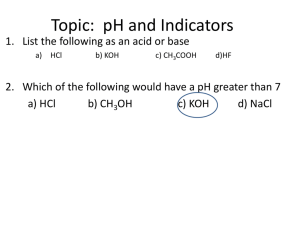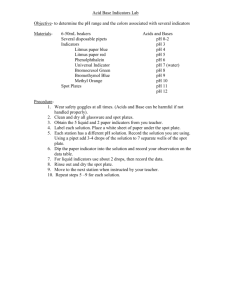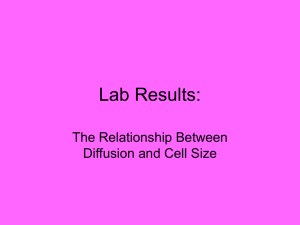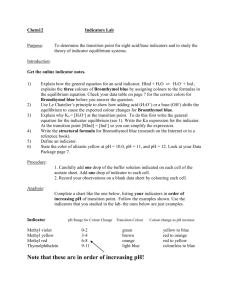CP CHEMISTRY Name: Indicators Lab ___ period Background: Acid
advertisement
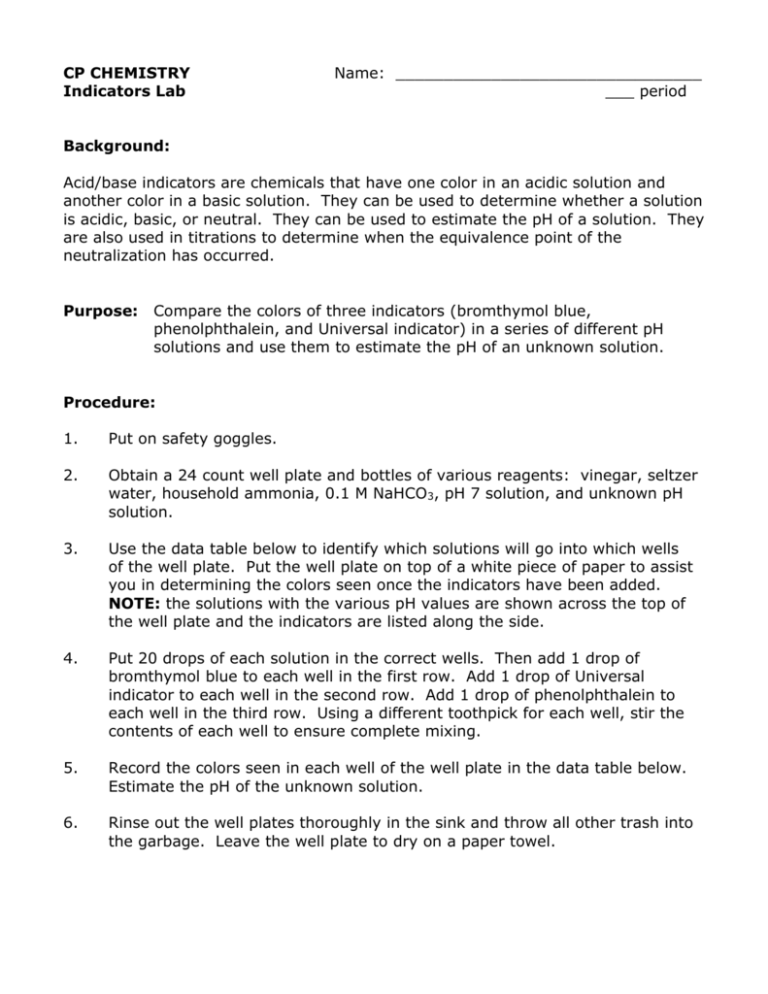
CP CHEMISTRY Indicators Lab Name: ________________________________ ___ period Background: Acid/base indicators are chemicals that have one color in an acidic solution and another color in a basic solution. They can be used to determine whether a solution is acidic, basic, or neutral. They can be used to estimate the pH of a solution. They are also used in titrations to determine when the equivalence point of the neutralization has occurred. Purpose: Compare the colors of three indicators (bromthymol blue, phenolphthalein, and Universal indicator) in a series of different pH solutions and use them to estimate the pH of an unknown solution. Procedure: 1. Put on safety goggles. 2. Obtain a 24 count well plate and bottles of various reagents: vinegar, seltzer water, household ammonia, 0.1 M NaHCO3, pH 7 solution, and unknown pH solution. 3. Use the data table below to identify which solutions will go into which wells of the well plate. Put the well plate on top of a white piece of paper to assist you in determining the colors seen once the indicators have been added. NOTE: the solutions with the various pH values are shown across the top of the well plate and the indicators are listed along the side. 4. Put 20 drops of each solution in the correct wells. Then add 1 drop of bromthymol blue to each well in the first row. Add 1 drop of Universal indicator to each well in the second row. Add 1 drop of phenolphthalein to each well in the third row. Using a different toothpick for each well, stir the contents of each well to ensure complete mixing. 5. Record the colors seen in each well of the well plate in the data table below. Estimate the pH of the unknown solution. 6. Rinse out the well plates thoroughly in the sink and throw all other trash into the garbage. Leave the well plate to dry on a paper towel. CP CHEMISTRY, Indicators Lab, page 2 Data: Indicators pH Solutions Vinegar pH = 3 Seltzer water pH = 5 Neutral pH = 7 0.1 M NaHCO3 pH = 10 Household Ammonia pH = 12 Unknown ___ pH solution Bromthymol Blue Universal Indicator Phenolphthalein 1. 2. At what pH do the indicators change color? Bromthymol blue ____________________________________ Universal Indicator ____________________________________ Phenolphthalein ____________________________________ Which indicator gives no information in the acid to neutral pH range? Conclusions: 1. When bromthymol blue is green, what is the relationship between hydrogen ions, H+, and hydroxide ions, OH-, in the solution? (>, <, or =) Explain. CP CHEMISTRY, Indicators Lab, page 3 2. What is the approximate pH of your unknown solution? Explain how you were able to determine this based on your data. 3. Is your unknown solution acidic, basic, or neutral? How do you know? 4. Which indicator would be most useful in testing a variety of solutions? Explain.
